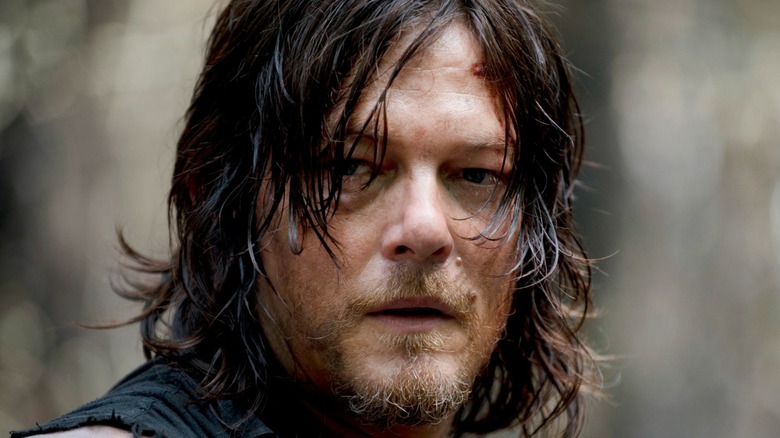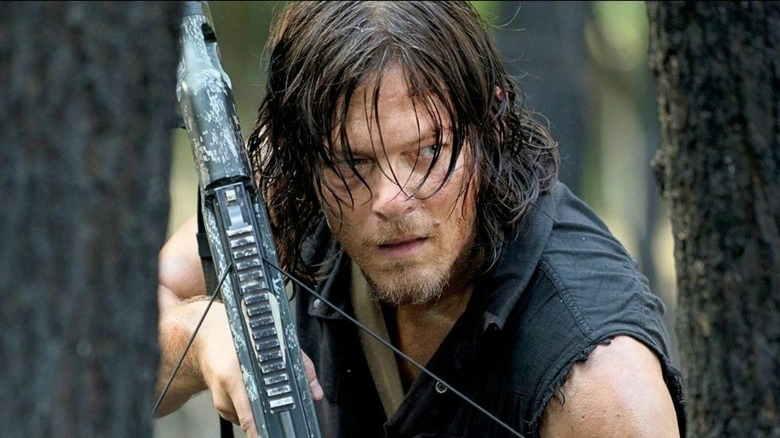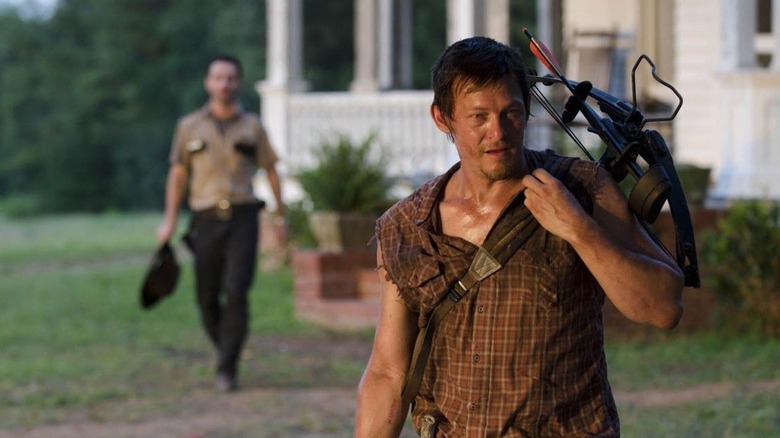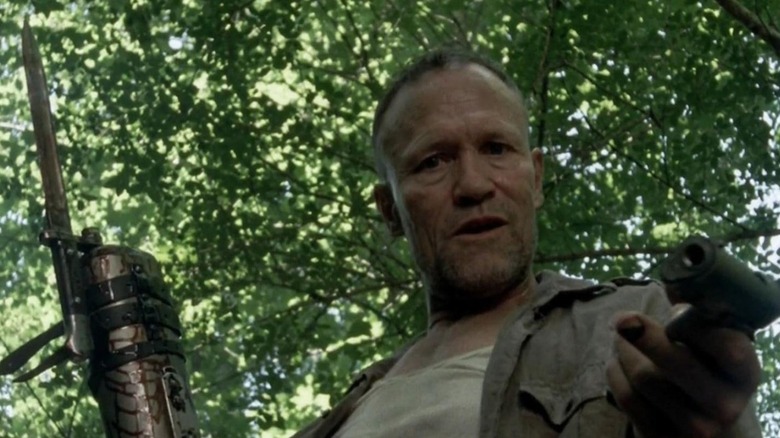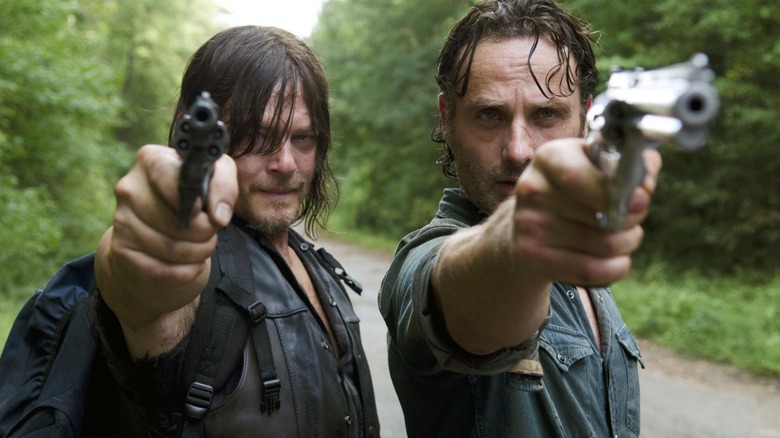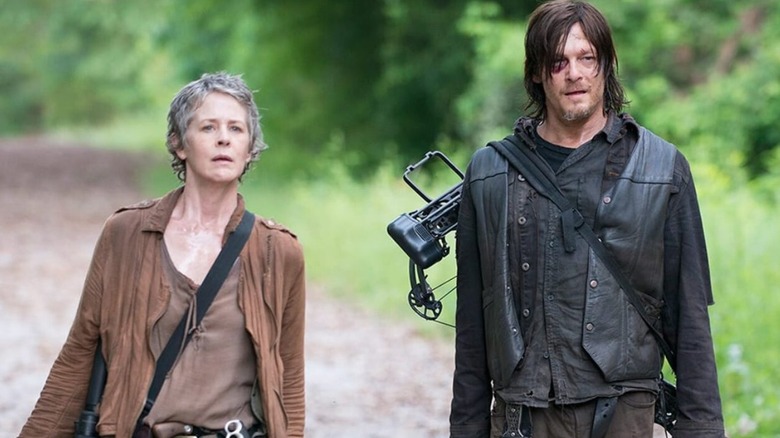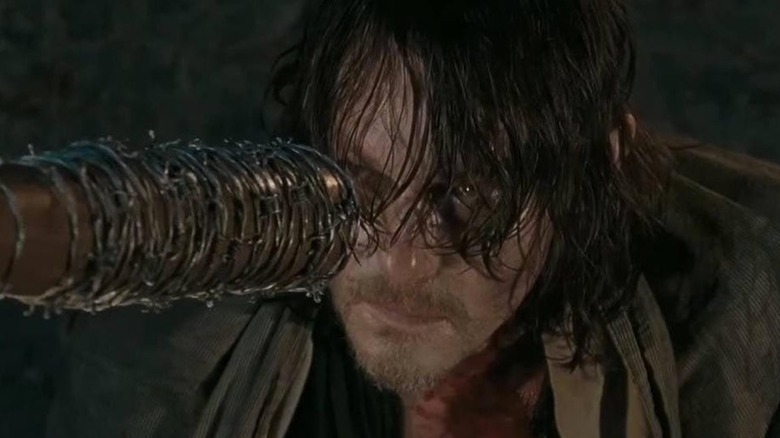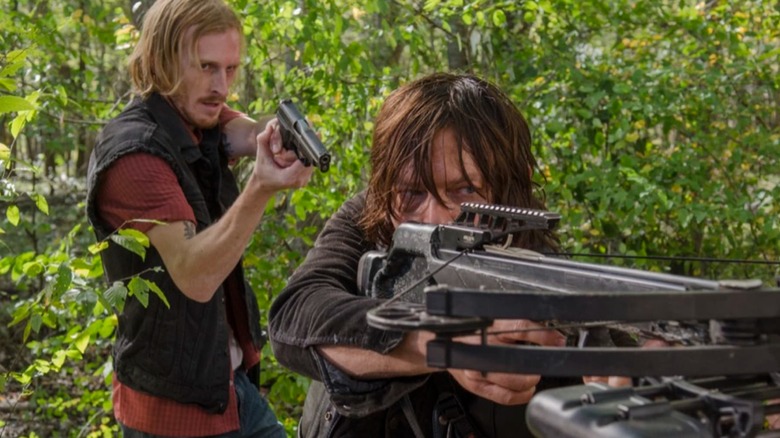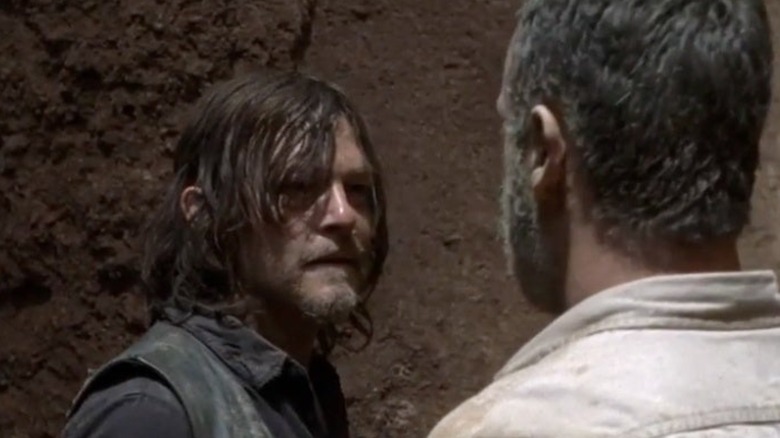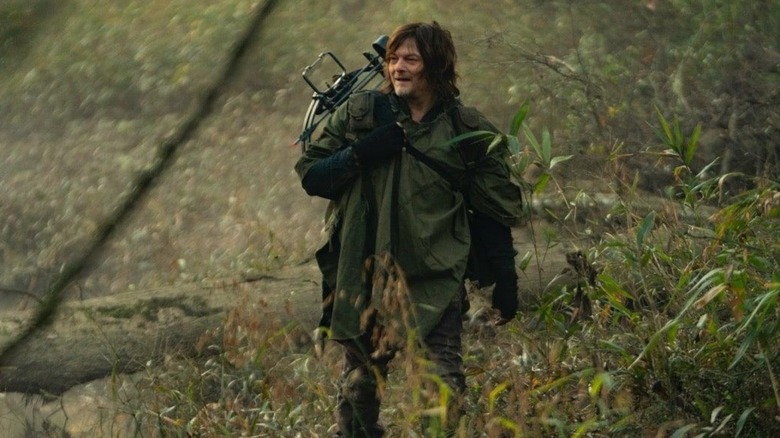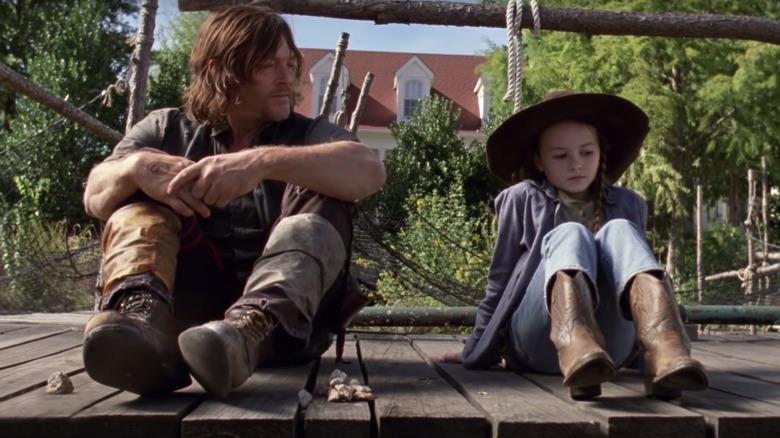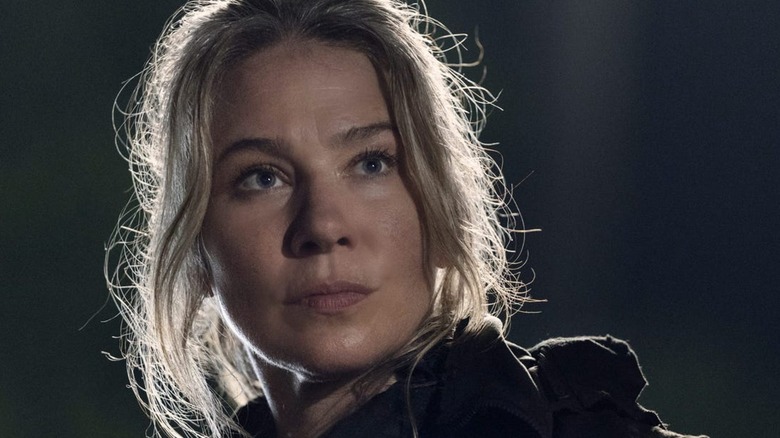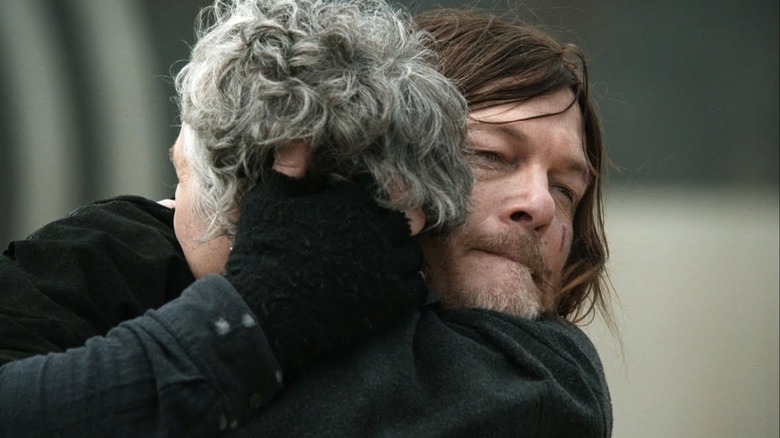The Only Walking Dead Recap You Need Before Watching The Daryl Dixon Spin-Off
"The Walking Dead" ended in 2022, but it already has more spin-offs than you can shake a stick at. Following the release of "Fear The Walking Dead" and "The Walking Dead: Dead City," fans have been looking forward to "The Walking Dead: Daryl Dixon." The show will be set in Europe, following former redneck ne'er-do-well Daryl Dixon (Norman Reedus), the only principal actor returning from the original cast.
"The Walking Dead" originated as a comic book series created by writer Robert Kirkman and artist Tony Moore. The story follows an ever-dwindling group of survivors in a zombie apocalypse, moving from place to place in search of a safe refuge from the undead "walkers," and also the numerous human dangers they encounter along the way. It made for an often exhilarating (if often frustrating) series that could sometimes feel unfocused and patchy, but Reedus' laconic performance ensured he emerged as a fan favorite. By the time the final season rolled around, he was just about the most well-rounded character on the show.
In order to prepare for the new series, we've put together a primer on everything you need to know about Daryl Dixon — from his beginnings as a hard-drinking loner, to his legacy as one of his community's most valued survivors.
Who is Daryl Dixon?
Most of the characters on "The Walking Dead" have counterparts in the comics. Some are radically different, and some have storylines that diverge, but there are only a few characters created especially for the show. Daryl is the most notable exception, a character who didn't even exist until Norman Reedus came in to audition. When Reedus auditioned, all the roles were cast, but he made such an impression that the part of Daryl was created specifically for him by showrunner Frank Darabont (with help from writers Charles H. Eglee, Jack LoGuidice and Robert Kirkman himself).
Upon his first appearance, he immediately stands apart from the rest of the ensemble cast, armed with his ever-present crossbow. Daryl is the surly and abrasive yet competent member of the main survivor group. Introduced as perhaps the most antisocial member of the Atlanta survivors, resolutely sticking to his own space and not joining with the rest of the ensemble, Daryl has a laconic, cynical outlook contrasted with his fierce loyalty to his friends. This, combined with a sometimes childlike nature — best demonstrated in his relationship with his elder brother Merle (Michael Rooker) — make him an endlessly fascinating character.
For most of the show, Daryl is rarely the focus of the story. Instead, the show tends to follow former Sheriff Rick Grimes (Andrew Lincoln) and those in his family, while other survivors had prominent story arcs. Even characters with less screen time are given more characterization than Daryl in the early seasons. This allows for a subtler kind of character progression, and by the end of the series he's gone from cynical outsider to a respected hero.
The Loner
Along with Carol Peletier (Melissa McBride), Daryl is the longest-serving character, appearing in a total of 175 episodes. He's introduced in the series' third episode as the lone wolf of the Atlanta survivors, perhaps the most capable hunter of the group. In his first appearance, he's just shot a deer with his crossbow, only to discover a Walker has already started eating it, tainting the meat. As he takes his frustration out on the dead body, Dale (Jeffrey DeMunn) tries to stop him, only for Daryl to respond, "Take that stupid hat and go back to 'On Golden Pond!'"
When he discovers that new arrival Rick has left Merle for dead on a rooftop, Daryl is understandably furious. But from his first scene it's clear that he's a very different character to his racist, misogynistic brother. He's hot-headed and quick to violence, but he's also focused and listens to reason — somehow we can't imagine Merle going along with Rick's rescue quite as willingly.
He keeps his own company for the first few seasons, lashing out at anyone who attempts to build bridges with him. With his surly demeanor and monosyllabic conversational skills, he's regularly dismissed as not too bright, but he repeatedly demonstrates that he is both quick-thinking and astute in his judgment.
Searching For Sophia
Though never as misanthropic as his brother, Daryl largely keeps his own company throughout the first season, being a part of the group while keeping apart from them. This continues in Season 2 when little Sophia (Madison Lintz) goes missing. Irritated by the slow progress and clueless blundering of the main group, Daryl begins his search for the missing girl, and proves his natural hunting abilities by successfully tracking her movements and finding places she's rested, even bringing a Cherokee Rose back for Sophia's mother Carol to give her hope. His steely determination puts the others to shame and speaks to the depth of his character. He's fiercely loyal to those in his circle, and will not give up once he sets his mind to a task.
He still maintains a distance between himself and the rest of the group, though, dismissing the platitudes of those who have largely given up any real hope of finding Sophia. He even offers words of real encouragement to Carol, memorably saying, "Am I the only one Zen around here? Good lord."
Season 2 is something of a game changer for Daryl. Despite Dale's assurance to Andrea ("We've all wanted to shoot Daryl"), he constantly proves himself as the group's most proficient hunter and killer. Appropriately enough, he finally consolidates his position as part of the group when Dale, the show's moral center, is eviscerated by a zombie and needs to be put out of his misery. With both Rick and Shane unwilling to do it, the ever-stoic Daryl steps up to do what's necessary.
The Dixon Brothers
Unlike his brother, so much of Daryl's meanness is a front. Scratch the surface and you see a vulnerable soul who has lived all his life in his brother's shadow. Before settling with the Atlanta survivors the Dixon brothers would drift from place to place, preying on the weak and trusting. Indeed, they were planning on robbing the Atlanta group before Merle had his rooftop encounter with Rick.
When Merle miraculously appears alive (albeit missing a hand) and allied with the mysterious Governor (David Morrissey), Daryl is faced with the biggest internal conflict he's encountered to that point. Despite all his growth, when confronted with Merle's forceful personality, he's so cowed that he struggles to emerge from his little brother role.
The brothers still have a twisted affection and loyalty for each other, despite their outward hostility. During their brief time on the run together, Daryl shows he's outgrown Merle when he saves a family from walkers, and prevents his brother from robbing them. When Daryl is finally confronted by a zombified Merle, he fully breaks down in tears before reluctantly killing the thing that used to be his brother.
The harrowing moment sums up the brothers' fraught relationship. There is a deep love there, as shown by Daryl's affecting reaction. But there's built-up anger and resentment, as demonstrated through the way Daryl utterly destroys Merle's head with his knife. It's a devastating scene in every respect, and Norman Reedus absolutely nails his performance.
Rick's Right Hand
After the prison saga, Rick increasingly comes to rely on Daryl as his trusted right-hand man. Up to this point, Daryl has regularly been the MVP of the group; he's a dependable fighter and has saved lives on countless occasions. However, it often feels like he's utilized as a tool — whether hunting or torturing baddies for information — rather than a valued member of the group.
After the Governor's assault on the prison, our survivors are forced to go their separate ways. Daryl joins up with Beth (Emily Kinney), but when she goes missing he falls in with (to put it mildly) a bad crowd. Led by Joe (Jeff Kober) the "Claimers" are a violent troop hunting down someone who killed one of their number — unbeknownst to Daryl, this turns out to be Rick.
Daryl confesses to Beth that, before the apocalypse, he was a follower, doing whatever was asked of him without question. Upon Beth's disappearance, he's vulnerable, and by joining Joe's gang, Daryl backslides to his previous ways.
This all changes when the gang finally catches up with Rick. Daryl stands up to Joe and pleads the case for letting Rick live, only to be severely beaten for his trouble. After the dust settles and the Claimers are dead, Daryl apologizes to Rick for not seeing the kind of men they were. Rick responds by telling Daryl, "You're my brother," and Daryl is visibly touched by this. It's validation that he's valued, and the loyalty cuts both ways.
Daryl and Carol
The most wholesome relationship in "The Walking Dead" has always been the budding friendship and mutual respect between Daryl and Carol. One of the show's more sensitive touches is the implied empathy Daryl feels for Carol as a wife who was regularly beaten by her husband Ed (Adam Minarovich). Both had fraught relationships with now-deceased abusive family members (Ed and Merle respectively), and both have proven they can adapt and thrive in their new surroundings.
During the search for Sophia, Carol sees something in Daryl, and when he's recuperating, Carol is the only one to thank him for his efforts. This bond deepens into a true understanding of one another. Daryl is a reticent character, but it doesn't take much to get him to open up, as is shown in his interactions with Carl and Beth, when he explicitly discusses his troubled upbringing. There's a subtle moment (well, subtle for "The Walking Dead") when he pockets a book on surviving childhood abuse when out on a supply run, only noticed by Carol when it falls out of his backpack. It shows that he's trying to change and to move past his traumatic past, and this makes the connection between him and Carol even stronger.
Aside from a few wry moments, the showrunners demonstrate admirable restraint in keeping their relationship platonic. There's a reason Carol is the only other character expected to return in the upcoming series — theirs is the most enduring, touching friendship of the entire series.
Reverting to old ways
Having assimilated into the community of Alexandria, things seem strangely peaceful for a while for the survivors, who reach out to other settlements in the hope of building a larger community. However, this draws the attention of Negan (Jeffrey Dean Morgan) and his Saviors, who descend on the group and easily capture them.
The first thing Negan does to assert his dominance over Rick's group is beat Abraham (Michael Cudlitz) to death with his barbed-wire covered baseball bat, "Lucille." When Daryl attacks him, Negan brutally murders sweet-natured Glenn (Steven Yeun) and takes Daryl hostage.
Never one to shy away from violence, in previous seasons at least Daryl took a pragmatic approach, even talking Carol down from killing Noah in Season 5. But upon escaping the Saviors and blaming himself for Glenn's death, Daryl begins to spiral into his former ruthless self. He becomes singularly focused on his goal of killing Negan, no matter who gets in his way, often butting heads with Rick. His old demons start to manifest in the callous way he kills former friend Morales (Juan Gabriel Pareja) and his decision to dispatch reluctant Saviors Todd (Lee Morris) and Joey (Joshua Hoover) without hesitation. He even drives a bus straight through the Sanctuary walls, allowing the walkers to kill prisoners and innocents as well as Saviors.
Daryl and Dwight
Though Daryl never appeared in the comics, there is a very similar character named Dwight who serves alongside Negan as one of the lead Saviors. When the Saviors storyline first began, many fans assumed Daryl would slip into the Dwight role, but the eventual storyline was a lot more interesting. Dwight does appear on the show (played by Austin Amelio), and instead of replacing Dwight, Daryl serves as a kind of positive reflection of him.
The two have an adversarial relationship from their very first encounter and constantly snipe and hurl abuse at each other in every interaction from then on. Daryl clearly despises Dwight despite the two being very similar. If Daryl had taken a different path, he could have quite easily ended up as Negan's right-hand man rather than Rick's (and his brief stint with the Claimers shows this). This realization is what brings Daryl back from his murderous streak. He sees how repentant Dwight is for his actions and allows him to live, to go and redeem himself by finding his missing wife. In doing so, Daryl prevents himself from going too far in his nihilistic spiral.
Working against Rick
After Negan and the Saviors have been defeated, there's tentative peace among the survivors, with Rick's group overseeing the disparate communities. Maggie (Lauren Cohan) leads Hilltop and Daryl takes over the Sanctuary, though he's uncomfortable in his role. There's a clear divide between Rick and the others, who view his allowing Negan to live as a weakness. Season 9 is a nice change of pace after the non-stop action of Season 10, with some real ideological conflict among the protagonists.
It's refreshing to see Rick challenged by Daryl, who's largely been following orders without question. It leads to some great characterization for both Maggie and Daryl, as they're confronted with the revelation that Negan — the man who tortured Daryl and murdered Maggie's husband — is alive and well. Daryl especially rankles under the position thrust on him and finds himself butting heads with Rick. It all culminates in a heart-to-heart in a deep pit where Daryl holds Rick to account for forgetting what he owed to Glenn and the others who have died for the rest of the group.
It's a harsh argument, but unlike Daryl's confrontations with Shane (Jon Bernthal), there's never a sense that the two will come to blows — Daryl even says to Rick, "I'd die for you." It just shows how far Daryl has grown as a character, that the former hotheaded loner now argues for a risk-averse approach, prioritizing the safety of his friends and the wider community above everything else.
Searching for Rick
At the midpoint of Season 9, Rick destroys a bridge full of walkers and seemingly dies in the explosion. Despite seeing him on the bridge when it blew up, Daryl refuses to believe that his friend is really dead, doggedly searching for him for about six years. He demonstrates his unwavering loyalty and a resolve that borders on obsession as he withdraws into an isolated existence in his attempts to locate the group's leader. His attempts to find Rick mirror the determination he showed in the search for both Sophia and Beth in previous seasons, although this time the result may be a little more promising.
Although he doesn't actually find Rick, he finds definitive proof that he is still alive, alleviating the urgency of Daryl's search and allowing him to rejoin the Alexandria community, where trouble is once again brewing. This is an important plot point, as the new spin-off will likely address Daryl's search for Rick and Michonne (Danai Gurira), at least in part. In the series finale of "The Walking Dead," Daryl promises Rick's daughter Judith (Cailey Fleming) that he will look for them, saying, "If I find anything, or see anything, I'll find them both and bring them home."
A surrogate father
Over the course of the series, Daryl's more caring side starts to show — most notably when Rick's daughter Judith is born, and he suggests the name "Little Ass Kicker" — but it's not until the Whisperer war that his paternal instinct emerges in earnest. During a raid when the Whisperers first reveal themselves, he and Michonne capture young Whisperer Lydia (Cassady McClincy).
Though imprisoned in the town jail, Daryl immediately recognizes the signs of abuse on Lydia, and slowly becomes her guardian, mentoring her and helping her adjust to her new life away from the Whisperers. Defending her from mistrustful or openly antagonistic survivors, he refuses to hand her over to her mother Alpha (Samantha Morton), the leader of the Whisperer army.
Lydia brings out a side of Daryl that has only been hinted at before, an emotionally mature, protective side. He even puts aside his hatred of Negan and works with him to destroy the Whisperers and bring Lydia home. He's such a positive influence that she ultimately chooses Daryl over her real mother.
It's a shame that after the fall of the Whisperers, Daryl and Lydia don't have many scenes together. He does prove to be an excellent surrogate father for Judith and RJ (Antony Azor) in the absence of Rick and Michonne. It's no coincidence that when Judith is shot in one of the final episodes she cries out "Daddy!" as he carries her to safety.
Leah
Despite forming some personal connections, Daryl remains chaste throughout the series — something that has led many fans to speculate he may be asexual. He at least has an almost childlike approach to romantic attachments, looking almost bashful whenever it comes up (see his uncomfortable reaction to Carol's "wanna screw around?" in Season 3).
In one of the standalone episodes that closed Season 10, it's revealed that following Rick's disappearance, Daryl found a kindred spirit in Leah (Lynn Collins). Similarly stoic and taciturn, they spend a lot of time together in the cabin they share, and trust builds between them as they bond over those they've lost.
This storyline may seem a little rushed, but whatever misgivings we might have about Leah's introduction, it pays off in the introduction of the Reapers. Leah vouches for Daryl, convincing Pope (Ritchie Coster) that he isn't with the Alexandrians. Daryl manages to play it smooth, clearly having learned the right lessons from Negan, who used a similar method to infiltrate the Whisperers.
Daryl and Leah are too loyal to their respective groups to just elope together. Daryl thinks Leah wants to leave the Reapers behind, when in fact she wants to supplant Pope and lead the Reapers herself. Unfortunately, Leah attacks Maggie, and Daryl decisively ends their relationship with a bullet to the head. It once again shows how Daryl will always put the group before himself, and that he hasn't forgotten Glenn's sacrifice.
A New Start
By the final season, Daryl emerges as the closest thing to a protagonist that the show has. His transformation from isolated loner to community leader takes 11 seasons, but feels organic and is one of the strongest character arcs among the vast ensemble. Having started as an antisocial loner, he ends up holding the survivors together. He makes personal sacrifices for the good of the community, and in the final season acts against his own nature (and better judgment) by joining the Commonwealth's militia. That would've previously been anathema to the anti-establishment Daryl we knew, yet it's entirely consistent with the caring character he's grown into.
His relationship with Carol gets put through the ringer in the final couple of seasons, as the presence of Leah drives a wedge between the two friends. Thankfully they reconcile by the series finale for an emotional farewell, before he rides his motorbike into the sunset. It's a touching way to end their story (for now), and a stark contrast to the repressed character from the first season.
But where is he going? It's left intentionally vague, but Maggie seems determined to learn more about how the Walkers are adapting, and it appears that she has tasked Daryl with a research mission to learn more about the origins of the zombie outbreak, a mission that seems destined to take him to France. With Judith stating that Daryl deserves his own happy ending, we just hope that, whatever dangers he faces, he achieves this by the end of the new spin-off.
